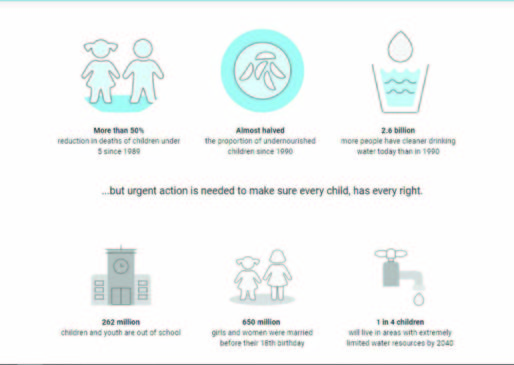 World Children’s Day was first established in 1954 as Universal Children’s Day and is celebrated on 20 November each year to promote international togetherness, awareness among children worldwide, and improving children’s welfare.
World Children’s Day was first established in 1954 as Universal Children’s Day and is celebrated on 20 November each year to promote international togetherness, awareness among children worldwide, and improving children’s welfare.
November 20th is an important date as it is the date in 1959 when the United Nations General Assembly adopted the Declaration of the Rights of the Child. It is also the date in 1989 when the UN General Assembly adopted the Convention on the Rights of the Child.
Since 1990, World Children’s Day also marks the anniversary of the date that the UN General Assembly adopted both the Declaration and the Convention on children’s rights.
Mothers and fathers, teachers, nurses and doctors, government leaders and civil society activists, religious and community elders, corporate moguls and media professionals, as well as young people and children themselves, can play an important part in making World Children’s Day relevant for their societies, communities and nations.
World Children’s Day offers each of us an inspirational entry-point to advocate, promote and celebrate children’s rights, translating into dialogues and actions that will build a better world for children.
World Children’s Day this year marks the 30th Anniversary of the Convention on the Rights of the Child (CRC), which recognises the human rights and special vulnerabilities of all children (persons under the age of 18 years), and establishes standards for protecting their well-being at all stages of their development. The Convention has been ratified by 195 States, making it the most widely ratified human rights treaty in history.
Over the past 30 years, the Convention has inspired improvements and protections that have transformed the lives of children; however, there is still much to do.
In his Message the UN Secretary-General, António Guterres urges all countries to honour the promise of the CRC. “Let’s build on advances and re-commit to putting children first,” and ensuring for every child, every right.
“For the first time, the Convention on the Rights of the Child spelled out a binding global commitment to the inherent rights of every single girl and boy. All countries recognized the unique vulnerability of children, and pledged to provide them with food, healthcare, education and protection.
“Since then, progress has been made. Child deaths have fallen by over half and global stunting has declined. But millions of children still suffer from war, poverty, discrimination and disease. Around the world, children are showing us their strength and leadership advocating for a more sustainable world for all,” Secretary-General Guterres said.
Children and young people have the same general human rights as adults and also specific rights that recognize their special needs. Children are neither the property of their parents nor are they helpless objects of charity. They are human beings and are the subject of their own rights.
The Convention on the Rights of the Child sets out the rights that must be realized for children to develop to their full potential.
The Convention offers a vision of the child as an individual and as a member of a family and community, with rights and responsibilities appropriate to his or her age and stage of development. By recognizing children’s rights in this way, the Convention firmly sets the focus on the whole child.
The Convention recognizes the fundamental human dignity of all children and the urgency of ensuring their well-being and development. It makes clear the idea that a basic quality of life should be the right of all children, rather than a privilege enjoyed by a few.
The importance of children’s rights
There are many reasons for singling out children’s rights in a separate human rights Convention:
• Children are individuals
Children are neither the possessions of parents nor of the state, nor are they mere people-in-the-making; they have equal status as members of the human family.
• Children start life as totally dependent beings
Children must rely on adults for the nurture and guidance they need to grow towards independence. Such nurture is ideally found from adults in children’s families, but when primary adult caregivers cannot meet children’s needs, it is up to the State as the primary duty bearer to find an alternative in the best interests of the child.
• The actions, or inactions, of government impact children more strongly than any other group in society
Practically every area of government policy – from education to public health – affects children to some degree. Short-sighted policymaking that fails to take children into account has a negative impact on the future of all members of society.
• Children’s views should be heard and considered in the political process
Children generally do not vote and do not traditionally take part in political processes. Without special attention to the opinions of children – as expressed at home and in schools, in local communities and even in governments – children’s views go unheard on the many important issues that affect them now or will affect them in the future.
• Many changes in society are having a disproportionate, and often negative, impact on children
Transformation of the family structure, globalization, climate change, digitalization, mass migration, shifting employment patterns and a shrinking social welfare net in many countries all have strong impacts on children. The impact of these changes can be particularly devastating in situations of armed conflict and other emergencies.
• The healthy development of children is crucial to the future well-being of any society
Because they are still developing, children are especially vulnerable – more so than adults – to poor living conditions such as poverty, inadequate health care, nutrition, safe water, housing and environmental pollution. The effects of disease, malnutrition and poverty threaten the future of children and therefore the future of the societies in which they live.
• The costs to society of failing its children are huge
Social research findings show that children’s earliest experiences significantly influence their future development. The course of their development determines their contribution, or cost, to society over the course of their lives. (UNICEF)



